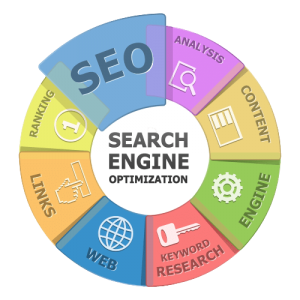SEO Service
We want to help your company rise the ranks on search engines like Google.

How SEO Helps your Business Grow
In today’s digital age, having a website is no longer a luxury, it’s a necessity. However, simply having a website is not enough; it needs to be optimized for search engines in order to be easily found by potential customers. We will be discussing the various techniques that can be used to optimize your website for search engines, specifically Google.
Keyword Research
The first step in optimizing your website is to identify the keywords that are relevant to your business. These keywords are the terms that potential customers will use when searching for products or services similar to yours. There are a variety of tools available, such as Google’s Keyword Planner, that can assist you in identifying the keywords that are most relevant to your business.
Once you have identified your keywords, you should incorporate them into the content of your website. This includes the headlines, subheadings, and body text of your pages. However, it’s important to note that keyword stuffing, or the overuse of keywords in an attempt to manipulate search rankings, is frowned upon by search engines and can result in penalties.
On-Page Optimization
In addition to incorporating keywords into your website’s content, there are a number of other on-page optimization techniques that can be employed. These include:
Title tags: These are the tags that appear in the browser tab and are used by search engines to understand the content of a webpage. Be sure to include your primary keywords in the title tag of each page.
Meta descriptions: These are the brief summaries that appear below the title in search engine results. They should be written in a way that entices users to click through to your website.
Headings: Use H1 tags for the main heading of a page, and H2 and H3 tags for subheadings.
Alt tags: These tags provide text descriptions of images, which can be read by search engines and assist in image search optimization.
URL structure: Use keywords in your URLs where possible, as this helps to indicate to search engines the content of the page.
Off-Page Optimization
Off-page optimization refers to the techniques that can be used to improve the search engine rankings of a website by increasing the number and quality of external links pointing to it. Some of the most effective off-page optimization techniques include:
Link building: This involves acquiring links from other websites to your own. High-quality links from reputable websites can greatly improve your search engine rankings.
Social media: Use social media platforms to promote your website and acquire links.
Press releases: Submit press releases to relevant publications that include links to your website.
Guest blogging: Write guest posts for other websites, including a link to your own website in the author bio.
Technical SEO
In addition to on-page and off-page optimization, there are a number of technical considerations that must be taken into account when optimizing a website for search engines. These include:
Site speed: Search engines favor fast-loading websites, so it’s important to optimize your images, reduce code bloat, and use a content delivery network (CDN) to improve load times.
Mobile-friendliness: More and more users are accessing the internet via mobile devices, so it’s important to ensure that your website is mobile-friendly and responsive.
XML sitemaps: These are files that help search engines to understand the structure of your website and the pages that it contains.
Robots.txt: This is a file that can be used
Our Mission
Page speed is highly important for SEO, the reason why we include website speed and performance optimization service in every new website we build. Our SEO strategy is tailored to your specific business. We impliment the developed strategy by integrating target keywords into content and website Meta data. SEO is not a one-time-only deal. You can’t set it and forget it. SEO requires on-going research, testing, tracking and adjusting.